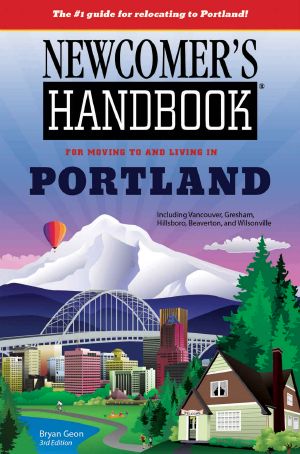Newcomer's Handbook for Moving to and Living in Portland · Including Vancouver, Gresham, Hillsboro, Beaverton, Tigard, and Wilsonville

- Authors
- Geon, Bryan
- Publisher
- First Books
- ISBN
- 9781937090173
- Date
- 2011-12-19T00:00:00+00:00
- Size
- 2.42 MB
- Lang
- en
Our second edition of the Newcomer's Handbook for Portland, this thirteenth title in the series approaches Portland with a sensibility appropriate to the city--with humor and a bit of delight in the quirkiness that exemplifies the Rose City. The guidebook features in-depth Portland neighborhood and suburban community profiles as well as chapters on all aspects of local life.
Welcome to Portland, one of the most livable urban areas in America! Call it Stumptown, Rose City, Beervana, Bridgetown, Puddletown, or PDX, it s your town now. (Just don t call it Portland, or-eh-GONE. The state name is pronounced OR-uh-gun. Practice before you arrive.) Portland is located at the northern end of the fertile Willamette Valley, roughly an hour east of the coast it s called the coast here, not the shore or the beach and an hour west of the crest of the Cascade Mountains. The high desert is a two-hour drive to the east, and world-class wineries are less than an hour southwest. Abundant recreational opportunities make the city a favorite of outdoor enthusiasts, and from the city s West Hills, and even from some downtown office buildings, it s possible to see the Columbia River Gorge and five snowcapped volcanoes: Mounts Hood, St. Helens, Adams, Rainier, and Jefferson. Top that, Topeka!
Of course, Portland s appeal transcends its spectacular setting. The city is known for its vibrant neighborhoods, progressive urban planning, environmental awareness, liberal politics, coffeehouse and brewpub culture, and, yes, for its rain. So what s it really like here? Well, though Portland enjoys more than its fair share of pleasant, well-preserved urban neighborhoods, connected to one another by bike lanes and transit and state law limiting the extent of urban sprawl it is also afflicted with strip malls, traffic congestion, ill-conceived development, and other assorted ills of the modern American metropolis. The key difference is that in Portland you can arrange your life so that you don t have to deal with those problems. If you want to live in a close-in neighborhood, within walking distance of cafés and food markets, and ride your bike to work every day, you can. (You won t necessarily be able to afford a house in such a neighborhood, however.) If you prefer to live in a suburban community, you can do that, too.
As for politics, Portlanders on average are more liberal than the citizens of the typical American burg when Money magazine rated Portland the country s best place to live in 2000, it warned conservatives to stay away but the city has a surprising diversity of political opinion, ranging from a strong libertarian contingent to a small community of Trotskyites. (The latter get nervous around ice picks.) Suburban communities are generally more conservative, and the region as a whole is probably no more liberal (or conservative) than any other large coastal metropolitan area.
If it s craft beer or coffee you re after, suffice it to say you won t be disappointed. There are 38 breweries in the Portland metro area, and locally produced craft beer makes up 11% of Oregon's beer consumption. (That figure may sound low, but it s by far the highest rate in the country.) And Portland's coffee scene is every bit the equal of Seattle's, with local roasters winning awards for both quality and sustainable business practices. Don't miss the burgeoning tea scene, either, based on well-established local tea manufacturers as well as an increasing number of unique tea houses. Many Portlanders consider coffee (or tea) essential for coping with the rain.
Ah, the rain. While it s true that Portland has its share of rainy days, much of the city's rainfall arrives in the form of a fine mist or drizzle. Often a day that starts out cloudy becomes bright and sunny by afternoon (or vice versa).